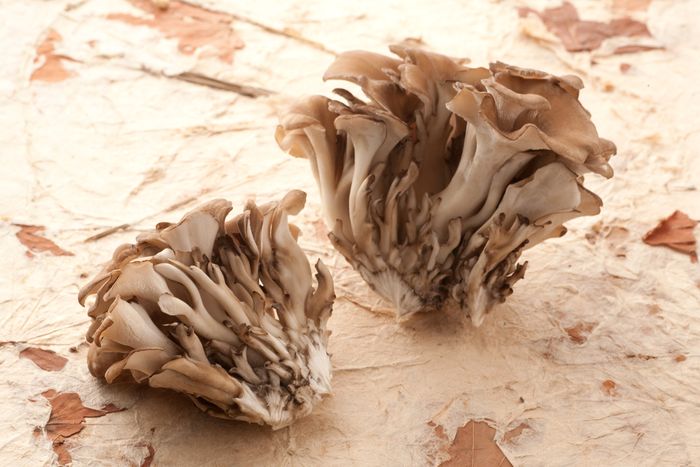Hen of the Woods: 5 Health Benefits of Maitake Mushrooms
Updated April 14, 2023.

White and black Maitake mushrooms, otherwise known as Hen of the Woods, are traditional Japanese mushrooms that appear to have many of the same benefits as the more mainstream functional mushrooms. The best and most popular benefits of Maitake mushrooms and their extracts are discussed in this article.
1. Maitake Mushrooms Are Nutritious
One of the primary health benefits of Maitake mushrooms is that they can be cooked and eaten in many dishes, similar to garden-variety white button mushrooms. This makes it far easier to supplement your diet with them to experience the nutritional benefits. Key factors of the nutritional profile of Maitake mushrooms are as follows:
- High in vitamins and minerals Maitake mushrooms are extremely nutritious, containing decent concentrations of vitamins B and C, copper, potassium, and other fibres and minerals. This suggests that Maitake could be used as an energy supplement.
- Protein and amino acids Although the protein content of Maitake mushrooms might not seem that high, they contain all nine essential amino acids.
- Low calories and no fat or cholesterol Surprisingly low amounts of calories and no fat means that Maitake mushrooms and their extracts may be good for weight loss and heart health.
2. Maitake Mushrooms May Help With Cancer
Maitake mushrooms are rich in beta-glucans and polysaccharides, which are two compounds believed to be effective in suppressing and preventing the growth of cancerous tumours. Research has shown that components of Maitake mushrooms not only stimulated the immune response against the progression of tumours but also decreased the immunosuppression common in cancer patients, thus potentially improving the quality of life in those undergoing chemotherapy.
3. Maitake Mushrooms May Help With Diabetes
Common medications for type 2 diabetes are combinations of insulin and hypoglycemic (blood-sugar-lowering) drugs. Research has shown that Maitake mushroom extracts seem to offer the same sort of properties. The linked study found that Maitake mushroom extracts administered to insulin-resistant mice caused a decrease in circulating blood glucose concentrations.
Although this suggests that Maitake mushrooms may be beneficial for those with type 2 diabetes, individuals should proceed with caution as taking them in combination with hypoglycemic drugs could result in dangerous adverse reactions.
4. Maitake Mushrooms May Boost the Immune System
As is common with all functional mushrooms, Maitake mushrooms appear to have beneficial effects on immune support. The polysaccharides and beta-glucans exhibit a host of benefits, such as being:
- Immunomodulatory
- Anti-cancer
- Anti-inflammatory
- Anti-oxidative
- Antimicrobial
- Antiviral
A study published in the Annals of Translational Medicine showed that Maitake mushroom extracts, "[Directly activated] the cells involved in immune reactions," and noted that, "Immunostimulating effects of natural molecules such as glucans are directly and/or indirectly caused by potentiation of synthesis and subsequent secretion of various cytokines."
Essentially, the study found that not only did Maitake mushroom extracts stimulate the efficiency of immune response cells but also triggered the body to secrete more compounds to further strengthen the immune system.
Additionally, the antimicrobial and antiviral effects of polysaccharides and beta-glucans show that Maitake mushrooms can effectively assist the immune system against several different types of diseases.
5. Maitake Mushrooms Are Anti-inflammatory and Anti-oxidative
As listed above, components of Maitake mushrooms have anti-inflammatory effects and anti-oxidative effects. In addition to benefitting the immune system, reduced inflammation can help alleviate symptoms of allergic reactions and inflammatory conditions. Additionally, reductions in oxidative stress can reduce the degenerative effects of aging.
Are Maitake Mushrooms Safe?
For the most part, Maitake mushrooms appear safe for most people, though there simply isn't enough research that looks at the potential side effects. Since Maitake is a type of fungus, individuals with mushroom or mould allergies should avoid them, as well as new and expecting mothers.
Additionally, although rare, some reported side effects of Maitake mushrooms include nausea and gastrointestinal problems. If you experience any side effects after consuming Maitake mushrooms, stop immediately and consult a doctor.







